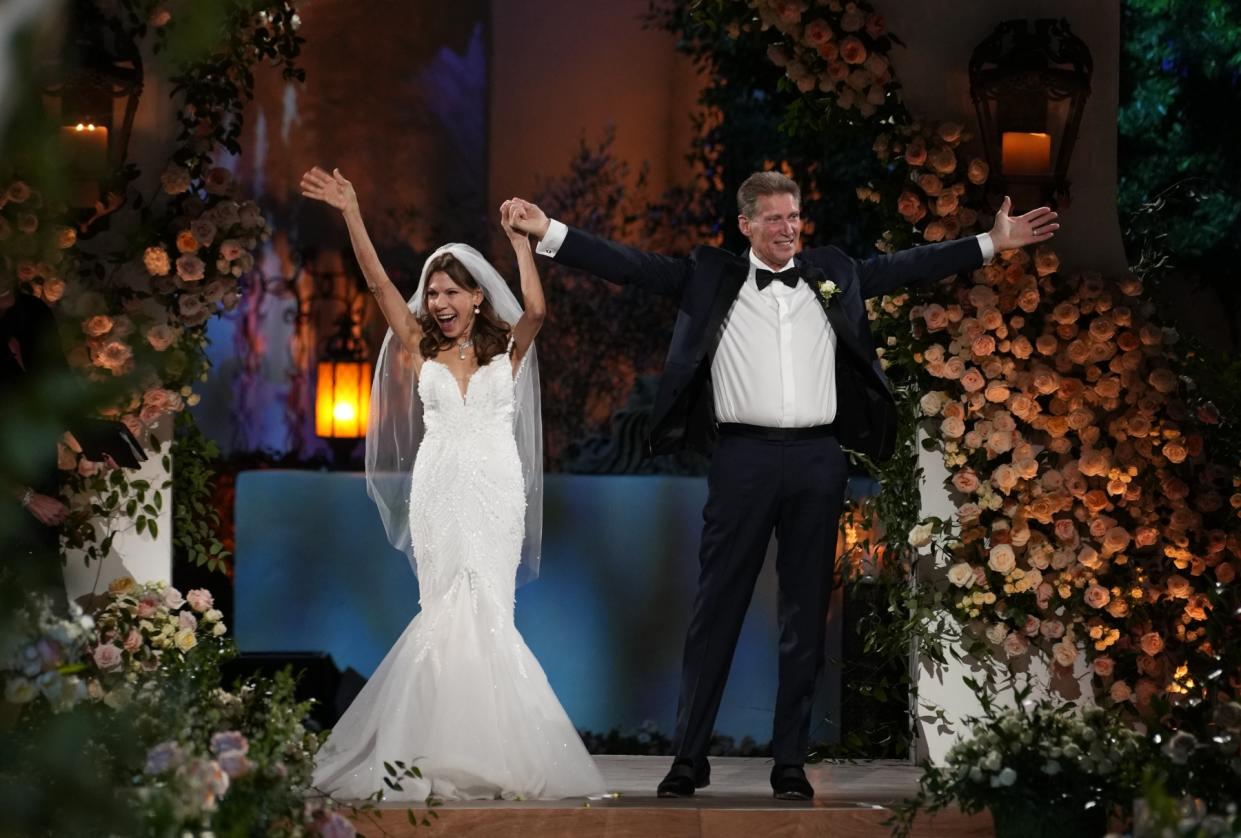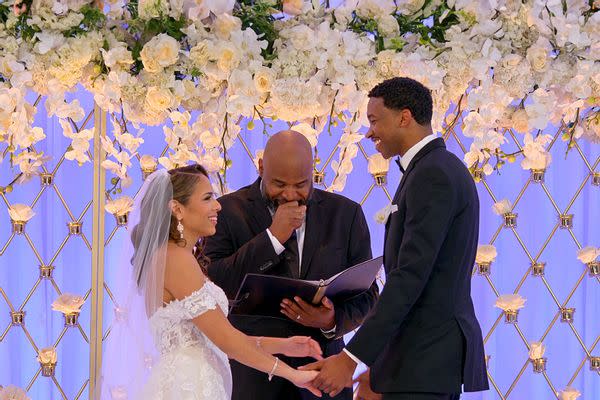What the "Bachelor" televised weddings offer us, despite roots in a franchise rife with fakery

- Oops!Something went wrong.Please try again later.
- Oops!Something went wrong.Please try again later.
- Oops!Something went wrong.Please try again later.
Poll after study shows a society-wide reappraisal of marriage’s necessity, but the “Bachelor” Nation will never accept those findings. There are two very simple reasons why. One, weddings make for the kind of event-driven TV spectacle that gives broadcast an edge over streaming. And two, the popularity of “The Golden Bachelor” proves there are some TV-generated unions worth rooting for – and few more than Gerry Turner and Theresa Nist’s, captured in ABC’s live Thursday night telecast of “The Golden Wedding.”
The septuagenarian couple’s exchange of rings and vows before a millions-strong audience of well-wishers is the ninth televised ceremony in the “Bachelor” franchise, including weddings of couples produced by “The Bachelor,” “The Bachelorette” and “Bachelor in Paradise.”
But out of all those series, Turner and Nist’s may be the most representative of lovelorn prayers answered. Viewers young and old were smitten by “The Golden Bachelor” mission to prove nobody is too old to find love along with falling head over heels for how genuine and normal these two seem.
That’s valuable currency in a genre stacked with fakery.
Their affection for each other is convincing. Why wouldn’t it be? These two subjected themselves to the TV reality romance competition gauntlet when they could have done virtually anything else.
That includes waiting to get married. A little more than four months is all that has transpired between the last day of filming, when the two became engaged and their wedding.
“Think about it this way,” Turner explained in a post-finale episode of the “Bachelor Nation” podcast. “You know, you can wait a year when you're 20 years old and it might be three or 4% of your remaining life. When you're 70, a year could be 10% or 20%. So we didn't want to put off what we really felt was right.”
He has a point. Turner’s also smart enough to know that this explanation may assuage some doubt as to whether “Bachelor”-manufactured “I do” will stick for the long haul. Lasting love is uncertain in any marriage, but when your courtship is compressed to a month, presented as a speed-dating cage match and televised in a heavily edited format, you can’t blame us for wondering.
This week provided us with fresh evidence that few “Bachelor” and “Bachelorette” matches are built to last, even ones that look solid. Days before Turner and Nist became marriage certificate official, Bryan Abasolo, the man “Bachelorette” star Rachel Lindsay chose in the 2017 edition of the series, filed a petition for divorce in Los Angeles Superior Court, citing irreconcilable differences.
Lindsay parlayed her popularity into a post-“Bachelorette” career that included a three-year stint as an “Extra” correspondent. As of now, we don’t know that Lindsay’s skyrocketing career is the reason for their bust-up after three years of marriage, although Abasolo, a chiropractor, is requesting spousal support and for Lindsay to pay his attorney’s fees.
But that confirms the cynical view that this made-for-TV marital pageantry is mostly meant to satisfy our parasocial craving to participate in entertainment industry coupledom. People have been pinning their hopes and disappointments on celebrities since cinema’s Golden Age. When they wed, their fans swoon; when stars divorce, people agonize over what went wrong.
So of course we’re invested in Turner and Nist’s Hollywood ending because, unlike the stars, they really are just like us. And if they don’t make it, despite their affection being nurtured in a laboratory setting, what hope do the rest of us have?
The first “Bachelor” wedding ever aired in 2003, for which ABC paid $1 million to inaugural “Bachelorette” Trista Rehn and Ryan Sutter to broadcast. That three-episode special drew some 26 million viewers, a feat few expect Turner and Nist to repeat today regardless of the notable uptick in ratings for “The Golden Bachelor.” The finale scored the franchise’s best total viewership since March 2021, with 6.1 million viewers tuning in, according to Nielsen live-plus-same-day data – impressive, but still 20 million shy of Trista and Ryan’s heights.
Today’s lower numbers aren’t evidence that we lack faith in true love’s existence – though that’s pessimistically prevalent these days among singles – but of wedding-driven reality TV’s expansion.

“The Bachelor" inspired "Love Is Blind,” a franchise whose nuptial returns have been steadily diminishing with each new season; the most recent yielded one ceremony that took. (In case you’re wondering, Lydia Velez Gonzalez and Milton Johnson were still going strong as of October 2023.)
In case you’ve forgotten, though, America first got to know the Netflix series’ host Nick Lachey in 2003 as the co-star of MTV’s “Newlyweds: Nick and Jessica,” in which he played the sensible Ricky Ricardo to his first wife Jessica Simpson’s exaggeratedly imbecilic Lucy.
Like “The Osbournes” heads of the household before them, Lachey and Simpson were already married before the cameras moved in, leaving us no opportunities to coo over rose petals, sequins and tulle.
The following year MTV's "'Til Death Do Us Part: Carmen & Dave" filled that gap by following Carmen Electra and Jane’s Addiction guitarist (and “Ink Master” judge) Dave Navarro for seven episodes, culminating in their over-the-top wedding and reception.
These early aughts relics ran around the same time as such there-and-gone ratings-grabs as Fox’s “Married By America” and Fox’s "Who Wants to Marry a Multi-Millionaire?” and the expressly exploitative “The Littlest Groom” which, surprise surprise, also aired on Fox. Other reality TV wedding circuses emerged from this primordial soup too, including a few that built an entire marriage-accessory block on TLC and a market for rubbernecking horror comedies like WEtv’s “Bridezillas.”
It can’t be an accident that this type of TV scattered across the landscape in the wake of Jennifer Aniston and Brad Pitt’s very private million-dollar Malibu wedding in 2000. That marriage didn’t last either, as grocery checkout tabloids keep reminding us 23 years and an additional (and even messier) Pitt divorce later.
To be clear, Brad and Jen’s reception was far from the only outsized wedding of its time to which 99.99% of the population wasn’t invited. It happened to be one that proved anew that the right stars – namely ones between a desirable, trendsetting star of TV’s top-rated show and one of cinema’s most popular leading men – could draw and hold a curious audience. Fellow A-listers were reminded that keeping one’s nuptials gathering private makes the public hungrier to glimpse their wedding photos. There’s a reason that Taylor Swift and Travis Kelce insist on teasing their fan. If they take things to the next level, imagine what they could rake in through media coverage exclusivity fees.
Want a daily wrap-up of all the news and commentary Salon has to offer? Subscribe to our morning newsletter, Crash Course.
But since then pop stars have been supplanted by Bravo housewives, “Bachelor” and “Bachelorette” stars are our celebrity wedding go-to in a culture lacking royals. We may have collectively cooed over The Duke and Duchess of Sussex’s televised 2018 marriage ceremony, but that is a once-in-a-lifetime extravaganza that decidedly will not repeat.
A “Bachelor” wedding has traipsed across our TV screens every couple of years since Jason Mesnick and runner-up Molly Malaney tied the knot in 2010. Not all of these unions have lasted, and at least one that transpired in Season 2 of “Bachelor in Paradise” was, in the eyes of the law, purely for show. (Although Lacy Faddoul appeared to pledge her troth beachside to Marcus Grodd in a 2015 episode, he told Life & Style magazine in 2017 that she never completed the paperwork once they returned to their real lives.)
But that hasn’t prevented us from getting hooked on the possibility of seeing two people go from horny strangers to a betrothed couple over the space of a few weeks.
“The Golden Wedding” and the years-long “After the Final Rose” show to which we probably won’t be privy to defy the previous long odds of success. Turner and Nist are at a point in their lives at which (one hopes) they have enough self-awareness to know what they want and what they’ll put up with. Both are either widows/widowers who enjoyed lasting marriages with the previous loves of their lives.
That makes them two people who already lived the romantic fantasy that “Bachelor” Nation sells and many of us aspire to achieve, whether in existing partnerships or potential ones. And they are famous, for now. But they also seem refreshingly common, two people who already lived the dream of loving marriages and had the good luck of finding love a second time around. If ABC wants us to witness the start of their happily ever after, who are we to turn our nose up at that sweet favor?

